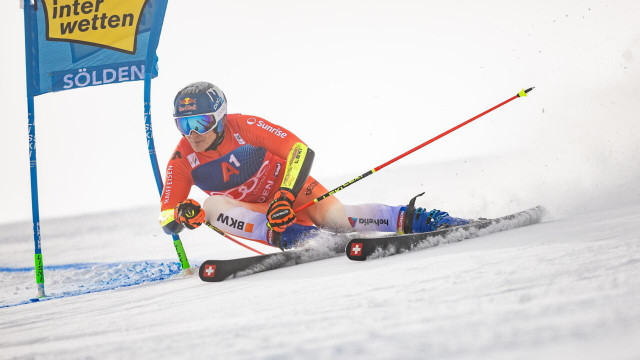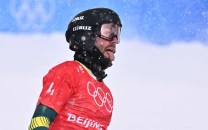Odermatt faces Kilde in cross-border ski opener
Men’s World Cup race overshadowed by environmental concerns on glaciers

The men's World Cup ski season belatedly gets underway in Zermatt-Cervinia this weekend with the prospect of a thrilling match-up between Marco Odermatt, the two-time Swiss holder of the crystal globe, and his Norwegian runner-up Aleksander Aamodt Kilde.
Provided that the forecast snow and wind allow the stage, which was cancelled last year, to go ahead, the Gran Becca promises to be a mouth-watering duel.
It will be the first cross-border race in the history of the World Cup, starting in Switzerland and finishing in Italy, a majestic setting facing the Matterhorn.
The event, however, which takes in two downhills on Saturday and Sunday, has been overshadowed by environmental issues as the diggers work away on the ever-dwindling glacier.
This new destination, which will have two women's events next weekend, is a response to the more technical course of Soelden in Austria, where last week's men's giant slalom was cancelled because of the weather.
With top speeds of 135 km/h, Zermatt-Cervinia is designed to create an "opening for speed".
According to its Swiss architect Didier Defago, the 2010 downhill Olympic champion, the piste will have everything "from jumps to long turns, from gliding passages to speed elements".
But as Odermatt, Aamodt and the other contenders chase the first victory of the season, the detractors will warn once again of the environmental dangers.
Olympic downhill runner-up Johan Clarey, meanwhile, roundly denounced it as "nonsense" with "huge helicopter resources, human resources to fill in the crevasses and make the track acceptable".
"The conditions on the glaciers are getting worse every year," said the 42-year-old, who retired in May.
Swiss newspaper '20 minutes' reignited the controversy in October with its pictures of diggers carving up the Theodule glacier to prepare the Gran Becca, in part outside the authorised ski area.
Urs Lehmann, president of the Swiss Ski Association, said the articles were "deliberately biased... at a time when climate change and sustainability have become central issues".
"Nobody would have skied on a glacier for decades" without bulldozers to make them safe, he added.
But Zermatt-Cervinia is a further illustration of the artificialisation of the mountains to host sporting events, even though the effects of global warming are spectacular.
At the 2022 Olympic Games in Beijing, snow machines were needed to provide a suitable surface on otherwise dry slopes. Helicopters and snow trucks were used in 2017 to prepare the legendary Austrian downhill at Kitzbuehel.
French skier Alexis Pinturault, who will be absent this weekend, is another who has expressed reservations about Zermatt-Cervinia.
"We want to preserve our environment and, at the same time, we want to continue our activity," said Pinturault in Soelden.
"The question is how we can do all that in the best possible way."


















COMMENTS
Comments are moderated and generally will be posted if they are on-topic and not abusive.
For more information, please see our Comments FAQ